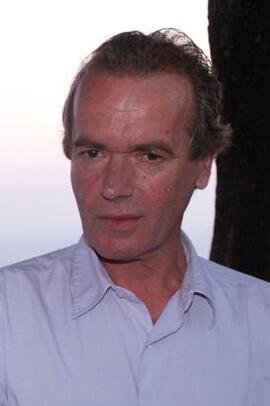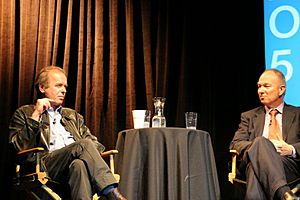Martin Amis facts for kids
Quick facts for kids
Martin Amis
FRSL
|
|
|---|---|

Amis in 2014
|
|
| Born | Martin Louis Amis 25 August 1949 Oxford, England |
| Died | 19 May 2023 (aged 73) Lake Worth Beach, Florida, US |
| Alma mater | Exeter College, Oxford |
| Notable works |
|
| Spouse |
|
| Children | 5 |
| Parents | Kingsley Amis (father) |
| Relatives | Sally Amis (sister) |
Martin Louis Amis (25 August 1949 – 19 May 2023) was an English writer. He wrote novels, essays, and screenplays. He is best known for his novels Money (1984) and London Fields (1989).
Amis won the James Tait Black Memorial Prize for his book Experience. He was also nominated twice for the important Booker Prize. From 2007 to 2011, he was a professor of creative writing at the University of Manchester. In 2008, The Times newspaper called him one of the top fifty British writers since 1945.
Amis's writing often looked at the extreme parts of modern Western society. He often used humor and exaggerated characters to show how strange he thought things were. He was inspired by writers like Saul Bellow and Vladimir Nabokov, as well as his own father, Kingsley Amis. Martin Amis also influenced many British writers who came after him.
Contents
Early Life and Education
Martin Amis was born in Oxford, England, on August 25, 1949. His father, Sir Kingsley Amis, was a famous English novelist. His mother was Hilary Ann Bardwell. Martin had an older brother, Philip, and a younger sister, Sally. His parents divorced when he was 12 years old.
Amis went to several schools. One headmaster even called him "unusually unpromising." When his father's first novel, Lucky Jim (1954), became famous, the family moved to Princeton, New Jersey, in the United States. His father taught there.
In 1965, at age 15, Amis acted in a movie called A High Wind in Jamaica.
Amis said he mostly read comic books until his stepmother, Elizabeth Jane Howard, introduced him to Jane Austen. He often said she was his first important influence. He later went to Exeter College, Oxford, and earned a top degree in English.
After college, he got a job at The Times Literary Supplement. At 27, he became the literary editor of the New Statesman. There, he met Christopher Hitchens, who became his closest friend.
First Steps in Writing
Amis's first novel was The Rachel Papers (1973). It won the Somerset Maugham Award. This book is about a smart, self-centered teenager and his girlfriend. Amis said the story was based on his own life.
His next novel, Dead Babies (1975), was more lighthearted. It followed a few days in the lives of some friends.
Success (1977) told the story of two foster-brothers, Gregory Riding and Terry Service. This book showed Amis's style of "pairing" characters, which he used often in his later novels.
Amis also wrote the movie script for Saturn 3 (1980). This experience later helped him write his fifth novel, Money.
Other People: A Mystery Story (1981) was about a young woman waking up from a coma. This book was important because it was the first time Amis showed the author's voice more clearly in the story. It was also the first novel he published after deciding to become a full-time writer in 1980.
Main Career Works
Novels of the 1980s and 1990s
Amis is most famous for his "London Trilogy": Money, London Fields, and The Information. These books are not connected by plot, but they all look at the lives of men in their middle age. They explore the messy and sometimes dark parts of life in late 20th-century Britain. Amis's main characters in these books are often flawed but interesting. They question normal life and try to escape its dullness. Amis believed that "everything tends towards disorder."
His 1997 novel, Night Train, was a short story told by Mike Hoolihan, a tough female detective. The book used the style of American crime fiction but surprised readers by not having a simple, exciting ending. Some critics didn't like it, but others defended it.
Works of the 2000s
The 2000s were a less busy time for Amis in terms of writing full novels. However, he wrote more non-fiction.
In 2000, Amis published his memoir called Experience. A memoir is a book about a part of someone's life. This book mainly focused on his unusual relationship with his father, Kingsley Amis. It also talked about other parts of his life, like meeting his daughter, Delilah, for the first time when she was 19. The book won the James Tait Black Memorial Prize for biography.
In 2002, Amis published Koba the Dread. This book was a strong look at the terrible crimes of leaders like Lenin and Stalin. It also discussed how many writers and thinkers in the West ignored these crimes.
His novel Yellow Dog (2003) was his first novel in six years. It was nominated for the Booker Prize, even though some reviews were very critical.
After the reviews for Yellow Dog, Amis moved to Uruguay with his family for two years. He worked on his next novel there, away from the pressures of the London writing world.
In 2006, after returning from Uruguay, Amis published House of Meetings. This short novel continued his focus on the crimes of Stalinism. It also looked at modern Russia. The story is about two brothers who were in a Siberian prison camp and loved the same woman.
Amis's last work of the 2000s was The Second Plane (2008). This was a collection of his writings about the events of 9/11 and the "War on Terror." The book received mixed reviews but was widely discussed.
Writing in the 2010s
In 2010, Amis published his long-awaited novel, The Pregnant Widow. The book's title comes from a quote by Alexander Herzen.
In 2012, Amis published Lionel Asbo: State of England. This novel is about Desmond Pepperdine and his uncle, Lionel Asbo, who is a rough and often criminal man. The story is set in a fictional British town and follows their lives, especially after Lionel wins a huge lottery prize.
Amis's 2014 novel, The Zone of Interest, was about the Holocaust. This was his second book to deal with this difficult subject. In it, Amis tried to imagine the daily lives of the Nazi officers who ran the death camps. He explored how their lack of care for human suffering affected them.
In 2017, he published a collection of his journalism called The Rub of Time. His next novel, Inside Story, came out in September 2020.
Other Works and Teaching
Amis also wrote two collections of short stories: Einstein's Monsters and Heavy Water. He published several books of his collected journalism and criticism. He also wrote a guide to 1980s arcade video games, Invasion of the Space Invaders, which he later said he didn't like.
He often appeared on TV and radio shows to discuss topics and wrote book reviews for newspapers.
University of Manchester
In February 2007, Amis became a professor of creative writing at the University of Manchester. He started teaching in September 2007. He led classes for advanced students and took part in public events.
Amis said he would be "sweet and gentle" with his students. He thought the experience might inspire him to write a new book. It was reported that he was paid £80,000 a year for 28 hours of teaching. This led to some discussion in the news.
In January 2011, Amis announced he would leave his university job. He said teaching at Manchester had been a "joy" and that he had "loved doing all the reading and the talking." He also said he liked the people of Manchester. The Irish writer Colm Tóibín took over his position.
While at Manchester University, Amis often had public discussions with other experts. They talked about literature, terrorism, religion, science, and other topics.
Personal Life
Amis returned to Britain in September 2006 after living in Uruguay for two and a half years. He lived there with his second wife, the writer Isabel Fonseca, and their two young daughters. In 2008, Amis became a grandfather.
He noted that he felt he had become more conservative in his views after returning to Britain. He was concerned by what he saw as growing dislike towards Israel and the United States.
In 2010, Amis bought a home in Cobble Hill, Brooklyn, US. In 2012, he wrote that he was moving from London to Cobble Hill. He also had a home in Lake Worth Beach, Florida, US.
Death
Martin Amis died on May 19, 2023, at his home in Florida. He passed away from oesophageal cancer. He was 73 years old, the same age his father died. Amis had been a smoker for many years, like his friend Christopher Hitchens, who also died from the same type of cancer.
Views on Topics

Nuclear Weapons
In the 1980s and 1990s, Amis strongly spoke out against the spread of nuclear weapons. His book of short stories, Einstein's Monsters, began with an essay called "Thinkability." In it, he wrote that nuclear weapons "repel all thought, perhaps because they can end all thought."
Politics and Elections
In June 2008, Amis supported Barack Obama for president of the United States. He believed Obama could improve America's image in the world. However, by the 2012 election, Amis felt "depressed and frightened" by the close race. He thought the Republicans had moved too far to the right.
In 2015, Amis criticized Labour leader Jeremy Corbyn. He described him as "humourless" and "under-educated."
Agnosticism
In 2006, Amis said that being an "agnostic is the only respectable position." An agnostic is someone who believes we cannot know if God exists because our knowledge of the universe is too small. He felt that atheism (believing there is no God) was "premature." He thought it was clear there wouldn't be a human-like God. However, the universe is "so incredibly complicated" that we cannot rule out the idea of "an intelligence" behind it.
In 2010, he repeated that agnosticism is the only logical view. He said that writers are individualists and that writing is about freedom. He believed it was narrow-minded for a writer to say there is "no other thing" beyond what we can see. He suggested there might be "something more intelligent than us."
See also
 In Spanish: Martin Amis para niños
In Spanish: Martin Amis para niños
 | Valerie Thomas |
 | Frederick McKinley Jones |
 | George Edward Alcorn Jr. |
 | Thomas Mensah |

